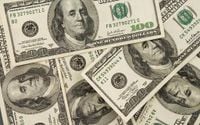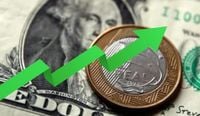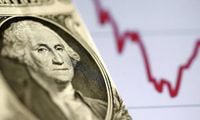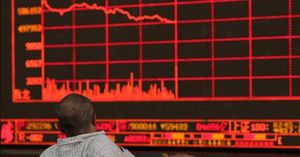On Monday, April 7, 2025, the value of the dollar in Brazil saw an increase, opening the week with a higher exchange rate. According to the Central Bank of Brazil, at 10 AM, the dollar was quoted at R$ 5.87, up from R$ 5.83 at the close on Friday, April 4. This rise in the dollar's value is attributed to growing fears of a global recession following the introduction of significant tariffs by U.S. President Donald Trump.
China is preparing to implement "extraordinary efforts" to counter the impacts of these tariffs, having announced a 34% charge on imports from the United States in retaliation to Trump's 54% surcharges. The decline in commodity prices globally has also negatively affected emerging market currencies, including the Brazilian real.
As of April 7, the commercial dollar was priced at R$ 5.8662 for buying and R$ 5.8668 for selling, while the tourism dollar was at R$ 5.946 for buying and R$ 6.126 for selling. Understanding the difference between the commercial and tourism dollar is crucial. The commercial dollar is primarily used in large transactions, such as imports and exports, and is priced lower due to the absence of additional fees. In contrast, the tourism dollar is utilized by individuals for international travel, which includes added costs such as IOF taxes, operational fees, and profit margins for currency exchange houses.
In the previous trading session, the commercial dollar closed with a rise of 1.29%, quoted at R$ 5.91. Earlier in the day, it had reached R$ 5.877, reflecting a 0.73% increase. On April 4, the dollar had closed at R$ 5.835, marking a notable rise of 3.68% in that session.
The uncertainty in the markets has been exacerbated by China's response to Trump's tariffs. Goldman Sachs has raised the probability of a U.S. recession from 35% to 45% following the announcement of the new tariffs. Meanwhile, J.P. Morgan has estimated the likelihood of recession to be as high as 60%, citing inflationary risks and international retaliation as significant concerns.
These tariffs, which came into effect on April 5, 2025, impose a 10% charge on imported products from more than 180 countries. Starting April 9, higher tariffs will target China and the European Union, with rates of 34% and 20%, respectively. In retaliation, China will begin taxing U.S. products on April 10.
The repercussions of these tariffs are expected to be felt in various sectors, particularly those heavily reliant on exports to the U.S., such as oil, coffee, steel, and aircraft manufacturing. The coffee sector may maintain its competitiveness due to the absence of domestic production in the U.S., while orange juice faces increased competition and may lose its advantage. Furthermore, the reaction of affected countries and blocs, including China and the European Union, could redirect exports to alternative markets, potentially benefiting Brazil's agribusiness.
On the domestic front, Brazilian financial markets are closely monitoring new projections from the Central Bank's weekly Focus report regarding inflation (IPCA), GDP growth, interest rates (Selic), and dollar forecasts for the next four years. The upcoming release of the IPCA data on April 11 could significantly influence expectations regarding the end of the Selic rate cut cycle.
Despite the perceived relief from a 10% tariff, the current economic landscape remains fraught with uncertainty and does not favor Brazil clearly. Economists predict that the new tariffs will slow down global economic growth and restrict international capital flows.
In political news, more than half of Brazilians (56%) oppose amnesty for those involved in the anti-democratic acts of January 8, 2023, according to a recent Quaest poll commissioned by Genial Investimentos. Only 34% support the release of those detained. Among voters for President Luiz Inácio Lula da Silva, 77% favor maintaining the detentions, while 32% of Jair Bolsonaro's supporters also reject amnesty.
On the same day the poll was released, Bolsonaro gathered four governors in São Paulo for a demonstration advocating for amnesty, with the University of São Paulo estimating attendance at 45,000, although police did not provide official numbers.
In financial discussions, a meeting of the Central Bank with bankers in São Paulo addressed the potential for BTG Pactual to acquire a stake in Banco Master, particularly focusing on its portfolio of precatórios. The discussions included an action pending in the Federal Regional Court of the First Region (TRF-1) awaiting a payment of R$ 14 billion from the federal government. BTG Pactual's André Esteves is seeking support from banks like Bradesco, Itaú, and Santander to facilitate the acquisition.
Meanwhile, in the U.S., the market is observing a light agenda of indicators. Investors are particularly focused on a speech by Federal Reserve official Adriana Kugler. The ongoing trade war between the U.S. and China has heightened global recession risks, putting markets on alert.
As Trump continues to assert that his administration will achieve historic victories despite the challenges, the economic landscape remains uncertain. The tariffs imposed on over 180 countries have raised prices on essential goods, and retailers are bracing for widespread price increases. With approximately 97% of clothing and footwear sold in the U.S. being imported, companies like Walmart, Gap, and Nike are likely to face significant cost pressures.
Estimates suggest that the price of a Chinese boot could rise from $77 to $115, while a Vietnamese sneaker may increase from $155 to $220 due to the new tariffs. In response, Taiwan has announced $2.7 billion in support for its industry, exempting only semiconductors from the new tariffs.






